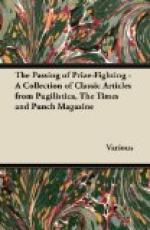* * * * *
From an article on the Zeebrugge exploit:—
“An on-shore wind was needed to carry the fog-screen in advance of the blockships. Absence of fog was essential. A fog would be beneficial. These desiderata postulated a concurrence of favourable conditions, and on April 23 they were not all present.”—Cologne Post.
We gather that the Censor, shortly to be demobilised at home, still maintains his watch on the Rhine.
* * * * *
CRITICISM IN EXCELSIS.
There was a good deal of excitement in the Elysian Fields when the news went round that the Committee had exercised their power of electing a certain distinguished Shade to full membership of the Asphodel Club without a ballot. The general opinion seemed to be that the Committee had acted wisely, and that the election was in every way justified. A few members, however, expressed disapproval, not so much on account of any demerits of his own as of the effect that his election might produce on the sensitive minds of some who were already members.
“This Dr. SAMUEL JOHNSON,” said one who had been busy in canvassing opinions, “is fully qualified for membership, but I fear he may have a deleterious effect on JOHN MILTON and THOMAS GRAY. Did he not roughly criticise them in his Lives of the Poets, and do you think that MILTON is one who will sit down tamely under the affront? MILTON has been for years and is still one of our most distinguished members. Indeed, he has almost the standing amongst us of a highly-respected Bishop. He uses the Club a great deal, and I fear his comfort will be much reduced by the admission of one who regards his poetry with a hostile eye.”
“In what way,” said another, “has the denouncer of SALMASIUS become entitled to complain of rough attacks? Nor has his character been assailed. In that he remains episcopal. Only in his poetry is he made to suffer.”
“But he is made to suffer pretty heavily,” said a third. “Hear what JOHNSON said with regard to our friend’s Lycidas:—
“’One of the poems on which much praise has been bestowed is Lycidas; of which the diction is harsh, the rhymes uncertain and the numbers unpleasing. What beauty there is we must therefore seek in the sentiments and images. It is not to be considered as the effusion of real passion; for passion runs not after remote allusions and obscure opinions. Passion plucks no berries from the myrtle and ivy, nor calls upon Arethuse and Mincius, nor tells of rough satyrs and fauns with cloven heel. Where there is leisure for fiction there is little grief.
“’In this poem there is no nature for there is no truth; there is no art for there is nothing new. Its form is that of a pastoral: easy, vulgar and therefore disgusting.’
“Do you call that criticism?”




